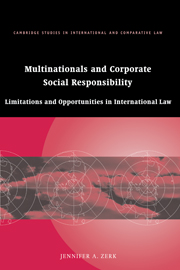 Multinationals and Corporate Social Responsibility
Multinationals and Corporate Social Responsibility Book contents
- Frontmatter
- Contents
- Preface
- Table of treaties, declarations and other international instruments
- Table of cases
- Table of statutes and statutory instruments
- List of abbreviations
- Introduction
- Part I Regulatory issues and problems
- Part II Home state regulation of multinationals
- 4 New directions in extraterritorial regulation of CSR standards
- 5 Private claims for personal injury and environmental harm
- Part III International regulation of multinationals
- Bibliography
- Index
- CAMBRIDGE STUDIES IN INTERNATIONAL AND COMPARATIVE LAW
4 - New directions in extraterritorial regulation of CSR standards
Published online by Cambridge University Press: 23 July 2009
- Frontmatter
- Contents
- Preface
- Table of treaties, declarations and other international instruments
- Table of cases
- Table of statutes and statutory instruments
- List of abbreviations
- Introduction
- Part I Regulatory issues and problems
- Part II Home state regulation of multinationals
- 4 New directions in extraterritorial regulation of CSR standards
- 5 Private claims for personal injury and environmental harm
- Part III International regulation of multinationals
- Bibliography
- Index
- CAMBRIDGE STUDIES IN INTERNATIONAL AND COMPARATIVE LAW
Summary
Extraterritorial jurisdiction over CSR standards has attracted relatively little academic attention to date. There are two reasons for this. First, overt assertions of extraterritorial jurisdiction by states in relation to social and environmental issues have so far been extremely rare. The social and environmental standards of companies are traditionally regarded as matters for the host state, in which the home state should not, as a general rule, interfere. Second, while attempts by states to influence social and environmental standards beyond their territorial boundaries may sometimes be controversial, they have so far tended not to provoke the same level of political conflict as has been generated by claims of extraterritorial jurisdiction in other regulatory areas, such as competition (or ‘anti-trust’) and economic sanctions.
But the rise of the CSR movement is causing home states to reassess their role in relation to the foreign activities of multinationals based in their respective jurisdictions. There is now a significant degree of public and NGO support for the idea that these states should take much greater interest in the social and environmental performance of multinationals in poorer countries. The previous chapter discusses the jurisdictional principles that limit the powers of home states to regulate the activities of multinationals in other states. However, it is suggested that, while there may be restrictions on ‘foreign-prescriptive’ regulation, there is still scope for other forms of ‘parent-based’ regulation, provided this is done sensitively, and does not infringe the principle of ‘non-intervention’ (i.e. that no state has the right to legislate or enforce its laws in such a way that this interferes in the domestic affairs of another state).
- Type
- Chapter
- Information
- Multinationals and Corporate Social ResponsibilityLimitations and Opportunities in International Law, pp. 145 - 197Publisher: Cambridge University PressPrint publication year: 2006
